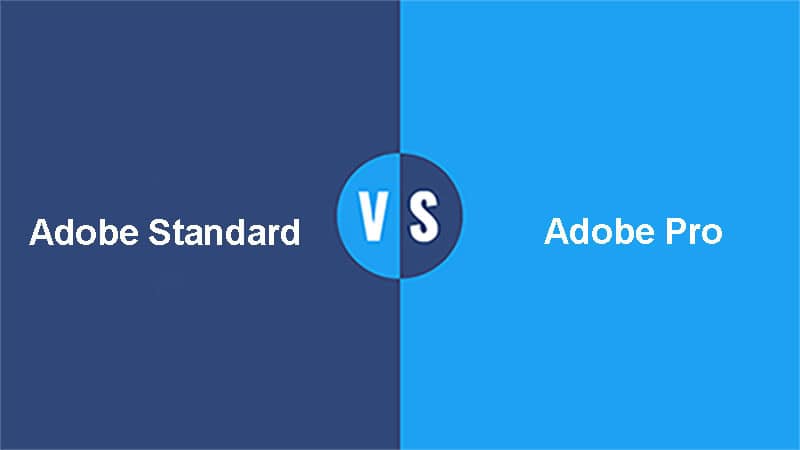For the majority of people, PDF means Adobe Acrobat. Adobe Acrobat software brought the PDF format and continues to rule in PDFs. Adobe Standard and Adobe Pro are two paid versions, with Adobe Pro costing more than Adobe Standard.
Adobe Standard vs Adobe Pro
The main difference between Adobe Standard and Adobe Pro is that Adobe Pro provides more features than those provided by Adobe Standard. Moreover, Adobe Standard is compatible with Windows only, whereas Adobe Pro is compatible with Windows and Mac OS.

Adobe Standard is a desktop software that enables the creation of PDFs, offers basic editing of PDFs, and allows users to share and collaborate on PDFs.
In addition to the above features, Adobe Pro facilitates the conversion of scanned paper documents into searchable and editable PDFs, allows the addition of audio, video, and interactive objects to PDFs, and offers enhanced editing, document comparison, and Bates numbering.
Comparison Table Between Adobe Standard and Adobe Pro
| Parameters of Comparison | Adobe Standard | Adobe Pro |
| Operating system support | Available for Windows only like versions 7, 8, and 10; Windows server 2008, 2012 | Available for both Windows and MacOS |
| Cost | Costs less than Adobe Pro as it has fewer features than Adobe Pro | Costs more than Adobe Standard a sit has more features than Adobe Standard |
| Targeted users | Works for personal use or home use | Works best for professional or business use |
| Sensitive information | Adobe Standard provides the option to permanently remove the sensation information from the PDFs | In addition to permanently removing, Adobe Pro provides the option to hide sensitive information from the view of particular viewers |
| Bates numbering | Do not allow Bates numbering | Allows Bates numbering needed in legal, medical, and business fields |
| Scanned documents PDF | Do not allow to search and edit in scanned documents PDF | Allows to search and edit in scanned documents PDF |
What is Adobe Standard?
Adobe Standard is a desktop software that provides features to create PDFs in multiple ways, like making PDFs from documents and images, from any printing application, merging more than one document and file type into a single PDF file, and converting web pages into interactive PDFs with live links.
Moreover, Adobe Standard offers basic editing features. One can delete, add, reorder, extract pages, and edit text and images. Further, bookmarks, watermarks, headers, and page numbering can be added. Adobe Standard also allows the deletion of sensitive data permanently. On Adobe Standard, PDFs can be converted into Microsoft Office documents and various image formats.
Another feature of Adobe Standard is sharing and collaborating on PDFs. PDF can be shared as a link to the file in Adobe Document Cloud or as an e-mail attachment. After that, one can add markups and comments, receive electronic and digital signatures, fill out the forms, and receive live notifications about the changes being made to the PDF.
Regarding the operating system support, Adobe Standard is available only for Windows 7, 8, 10, and Windows Server 2008 and 2012.
What is Adobe Pro?
Adobe Pro is software that provides all the features the Adobe Standard provides. However, as it costs more than Adobe Standard, it offers some additional features and options that Adobe Standard does not provide. Moreover, Adobe Pro allows you to search and edit the text in the PDF of scanned paper documents, which Adobe Standard does not allow. Also, Adobe Pro’s recognition ability to recognize text in many languages allows it to search and edit data easily in the document.
Furthermore, Adobe Pro provides more enhanced editing options. It allows Bates numbering for medical, legal, and business documents and enables adding video, audio, and interactive objects to PDFs. In addition, it offers the option to obscure or delete sensitive information so that the sensitive information is visible to selected people only whom you want to show. Adobe Standard provides the option only permanently to delete sensitive information. Adobe Pro also offers editing PDFs on mobile phones and tablets, which is not the case with Adobe Standard.
Another additional feature is document comparison. Adobe Pro facilitates the comparison of two versions of the same PDF side by side to see whether the needed edits and changes are made or to what extent. Furthermore, it is compatible with both Windows and Mac OS. It suits best for professional or business use.
Main Differences Between Adobe Standard and Adobe Pro
- Adobe Pro provides more options and features than Adobe Standard. As a result, Adobe Pro costs more than Adobe Standard.
- Adobe Standard is available for Windows only, while Adobe Pro is available for Windows and Mac OS. As a result, Windows users have two alternatives to choose from (Adobe Standard and Adobe Pro), and Mac OS users’ choice is limited to Adobe Pro only.
- Adobe Standard allows only to convert the scanned paper documents into PDFs that can be viewed and shared. On the other hand, Adobe Pro allows the creation of searchable and editable scanned Documents PDFs.
- Adobe Standard provides an option only to delete the sensitive information permanently. However, Adobe Pro allows only making visible or invisible sensitive information to selective viewers.
- Adobe Pro allows for Bates numbering, editing on mobile phones and tablets, and adding audio, video, and interactive objects to PDFs. Adobe Standard provides neither of these.
Conclusion
Differences are as simple as they appear. Paying more gets you more features. However, Possessing Mac OS limits you to Adobe Pro only. Before opting between Adobe Standard and Adobe Pro -when possessing Windows- usage and purpose must be considered. Adobe Standard with basic features suitable for personal or home use. On the other hand, Adobe Pro has more business or professional features.




















